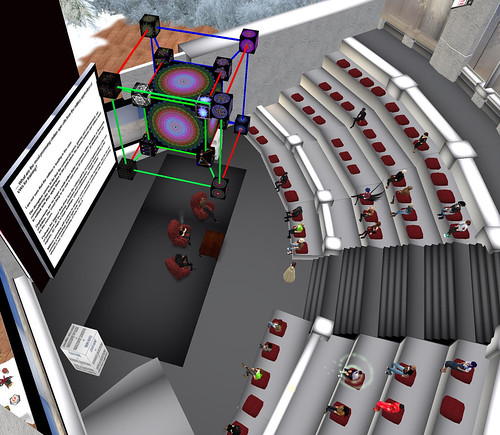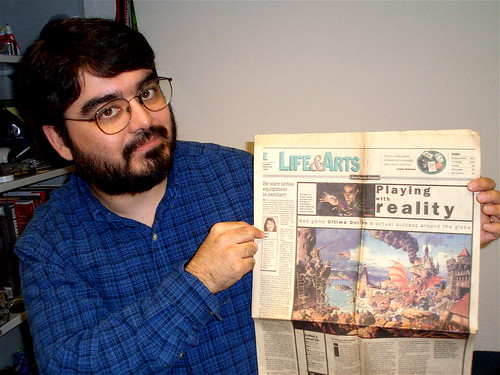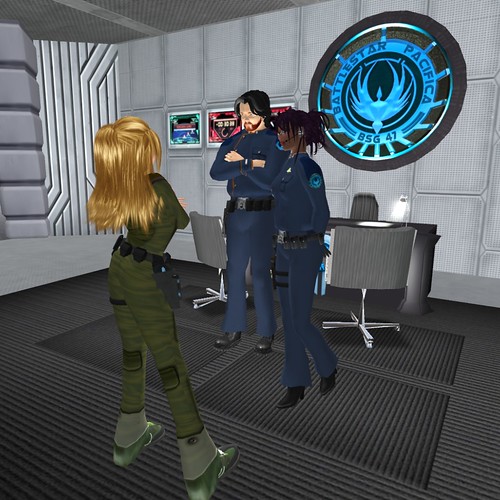Location: Midpoint of Boston-Atlanta Metropolitan Axis
image credit: Barclay Shaw
The students in
my first-year seminar may not understand, for a book published before they were even born, how William Gibson's
Neuromancer not only shook up the genre of science fiction but also helped spawn a revolution in how those building the Web and its applications regard information
When I created a Second Life account in 2007, I left it an open question, in the "first life" tab for the avatar, as to whether Gibson's future would be realized in SL. Now I have the feeling that my question needed a broader scope: has Gibson's future been realized in both the worlds of, to use his dichotomy, meat
and mind? If anything SL tries hard to be Gibsonian but fails: no one is as immersed as Case is in the novel, nor, for that matter, Molly and Armitage in their own part of futurity.
Mostly, however, Gibson got things close enough to scare me. As Egypt's government
shuts down Internet access and cell-phone services, I recognize an eerie parallel to Wu's idea of a Master Switch that did not exist in 1984, when Neuromancer appeared. Gibson envisioned a more open Net than we have or that Wu believes we might get, but Gibson conceded that the "spiral arms of military systems" (52) would be forever beyond the reach of loners like Case. They still are.
Yet using free public software, a million disenfranchised loners have united to topple Egypt's government, and at the time of writing this they may get their wish. The keepers of those spiral arms, the Egyptian government, like their counterparts in Iran a few years back, know that their foes need cell telephony and Facebook to organize.
The rest of the world can only sit back and watch the chaos and, in Saudi Arabia, the government may be patting itself on the back for shutting out Facebook not so long ago.
But if Gibson were actually prophetic, then other aspects of his future should be closer to our door than the streets of Cairo.
Zaibatsus and Archologies
Put a Fuller Dome over many exurban gated communities in the US and Western Europe and you'd have the residential component of
Neuromancer's way of life for the megacorporations: happy corporate employees going to their desks and conference rooms to plan and build a world to maximize a company's return on investment. Shopping and entertainment are only at a small remove, along the suburban sprawl, from the home cocoons. Only cheap oil has meant that workers drive to various destinations, instead of living and working and shopping together in the same place.
What would an arcology look like? There is one very Gibsonian building at the Web site of
Yanko Design. Called
NOAH (New Orleans Arcology Habitat) it evokes the end-times of a next Big Storm and the sense of heroic futurism that the megacorps might project in a post-governmental world. The comments on the proposal fascinate me: techno-dread and triumphalism characterize the remarks.
Following the logic of governmental minimalists and libertarians in the United States, whose voices are loud these days, a future where self-defining communities evolve into self-governing ones may not be so far-fetched. At the consensual level, it may already be as close as one's neighborhood covenant.
But the coming of Corporate Man (and Woman) has concurrently meant an increased stratification of wealth in US communities. Bruce Sterling once quipped that the 1980s dawned not only as the first American decade that seemed like science fiction but also a return to a neo-Victorian world with social-Darwinist conditions for citizens. How did that vision, crystallized in
Neuromancer, pan out?
What follows is less critical than it might seem. In fact, as I'll note, I'm not sure it's ever been otherwise, except for its sheer scale. In 2007, the 1% of American citizens controlled 43% of financial wealth and 35% of net worth. The title of the report where I gathered this, "
Who Rules America," gave an ideological slant that made me a little doubtful about the lack of bias by Professor Domhoff, so I found another source.
The US Census Bureau's report,"A Brief Look at Postwar U.S. Income Inequality" paints a picture not unlike Dumhoff's:
The long-run increase in income inequality is related to changes in the Nation’s labor market and its household com- position. The wage distribution has become considerably more unequal with more highly skilled, trained, and educated workers at the top experiencing real wage gains and those at the bottom real wage losses.
There's more at the
Census Web site. I become a little less convinced, then, that Dumhoff is riding a hobby horse of leftist angst. One should pause before numbers like these from Domhoff: "Of all the new financial wealth created by the American economy in that 21-year-period, [1983-2004] fully 42% of it went to the top 1%."
Even so, the distribution of wealth before 1983 was not one of which I'm proud, given my belief that a large and politically active middle-class of property owners, such as all those returning GIs in 1945, can be an excellent shield against the sort of governance (and lack of it) Gibson portrays. Citizens like the GIs who built the neighborhood were I now live, of modest ambitions and demeanor, have historically been eager to protect their families and thus they've supported strong policing and orderly neighborhoods. Except for the turbulence of 1968, America has never had Egyptian-style chaos in the streets: Egypt has no middle class any longer, by all accounts.
Sadly, after 2008 and the financial meltdown, many more Americans have been thrown out of our middle class. Each foreclosure and failed company could take us a step closer to a neo-Victorian form of income inequality that characterizes Cyberpunk's view of the future. And I doubt that all of the millions of dispossessed will leave their bank-seized homes peacefully. 2011 may be an interesting year.
Console Cowboys
But housing, like travel to Case, is a "meat thing." On the mind front, the lone cyber-cowboys of Gibson's world have not emerged. Wikileaks' revelations took a team of dedicated "hacktivists" to accomplish. At the same time, another aspect of current hacking comes straight from
Neuromancer.
The cyber-attack on Iran's nuclear installations may have set back the nation's bomb-building program for some time. In a world like Gibson's, a zaibatsu might have stopped a rogue nation, given the failure of the US and Soviet governments after Operation Screaming Fist. In our actuality, Israel and the US and who knows else might have launched the attack. Thus we've moved further along than Gibson's world, technologically.
The Soviet computer centers Armitage mentions had to be attacked with Special-Forces hacker-operatives sent in on microlight gliders. In our world, Iran's systems are tied to the global Internet. So are ours, and both China and the US are quietly jockeying, behind the scenes, to develop cyberwar teams. If our nations ever go to war, Internet services and all its dependent systems--power grids, air-traffic systems, banking--will become legitimate domestic targets.
Street Samurai
On the "meat" front, our Molly might be named "Mike."
Burly men doing legitimate (and, at times, dirty) deeds for whatever Blackwater is now called, and firms like it, does not quite have the sex-appeal of Gibson's razorgirl.
At the same time, for this reader it would have been impossible in the early 80s to imagine Mercs, and that is what all "private security contractors" are, Mercenaries, enjoying the cultural acceptance they now enjoy. Many of my fellow citizens get a bit queasy on this subject, but for the past decade the US government has relied on Mercs to do jobs we do not wish to task to our armed forces or that require manpower we simply do not have in uniform without drafting college-aged kids.
In the 80s, except for
Soldier of Fortune readers, the use of mercenaries by our government would have stirred widespread outrage. Now, if I may risk a generalization, with a 24/7 new cycle the attention of the public appears to move faster than it did 26 years ago, to the latest tragedy, scandal, or political circus. Meanwhile, private security companies have limited accountability to US or international law. They are true Gibsonian figures of the "interzone where art wasn't quite crime, crime not quite art" (44). Put in "law" for "art" and you have our situation.
Meanwhile, poor Molly. I don't think Gibson meant her to become a meme, but she has.
I'm glad we don't have razorgirl mercs walking the night cities of our world, but Molly can be found elsewhere: she's the badass sex-object of a hundred video games and action / adventure films. Hollywood understands male lust for these tough babes with guns and blades. Molly scares and attracts the boys, and I'm sure that more than a few male readers empathize with Case when he gets to enjoy her pleasures.
Naturally, one recent attempt to cast a film based upon the book would have featured Milla Jovovich as Molly:
Resident Evil's killer star would get to put on the mirror eye-inserts. It's that way in any number of films or games where the strong woman is just as much a sex object as any gatefold playmate. As my students will see when they get further into the book, there's that dark and disgusting desire out there to have a "meat puppet." That technology is perhaps the most frightening of the book and, like organ-markets and stim-sim sets, it remains possible but not part of our lives.
We have Microsoft as a multinational, not microsofts that one puts into a skull-plug to learn a new skill. And the best we can do for Stim-Sim is the current 3D craze. Merge it with a Wii or Kinect, and we may approach something like watching through Tally Isham's eyes in her latest episode.
Better Living Through Bioengineering?
When students on campus trade Ritalin to do better on exams, yes, we live in a cyberpunk world. My students are afraid of our "street" and, whipped up the ladder by well meaning parents and educators like me, do their best to avoid it whatever the emotional cost.
At least, if any of us do wind up on the streets with between two and three million American homeless, we do not have to cope with illegal dealers in pituitary glands or black clinics in the worst part of town, ready to roll us for our kidneys.
In scope if not depth, Gibson was spot on about the culture of body modification, when teens have elective cosmetic surgery and their parents get Botox regularly. A single earring was a novelty on a man in 1984, and potentially a dangerous one. Now tats and piercings are common.
A dermatologist, who helped my mother with a degenerative eye disorder that required a monthly Botox injection, told me he'd given up on really iffy surgery that could land him in court. Instead, his income came mostly from vanity, that ready fix of Botox to keep the bathroom mirror lying to his patients every morning.
Verdict: Close Enough to Scare Me
Image Source: Unknown
In the end, we don't, and probably never will, have orbiting colonies of Rastas or French spas run by a maniacal and inbred family. I doubt that our planet has enough fossil fuels that are cheaply available to sustain enough wealth to make dreams like Richard Branson's, of cheap space tourism, happen. If I'm wrong, I'll be too old to get the ride to orbit I've wanted since I saw a Gemini launch in the mid 1960s.
In other regards, however, I'm happy to say that Gibson got a great deal wrong. May it continue to be so, because what he predicted correctly has been frightening enough. Ours is a harder-edged world than it was in 1984, when the Cold War raged on. And the technologies of interconnection empower lots of individuals. Al Quaeda, not the Panther Moderns, uses the Internet but the violence engendered is still the stuff of nightmare.
So, Bill, thanks for all of the bad dreams. You really invented a genre and, in some ways, a world.
Work Cited:
Gibson, William.
Neuromancer. New York: Ace, 1984.



















